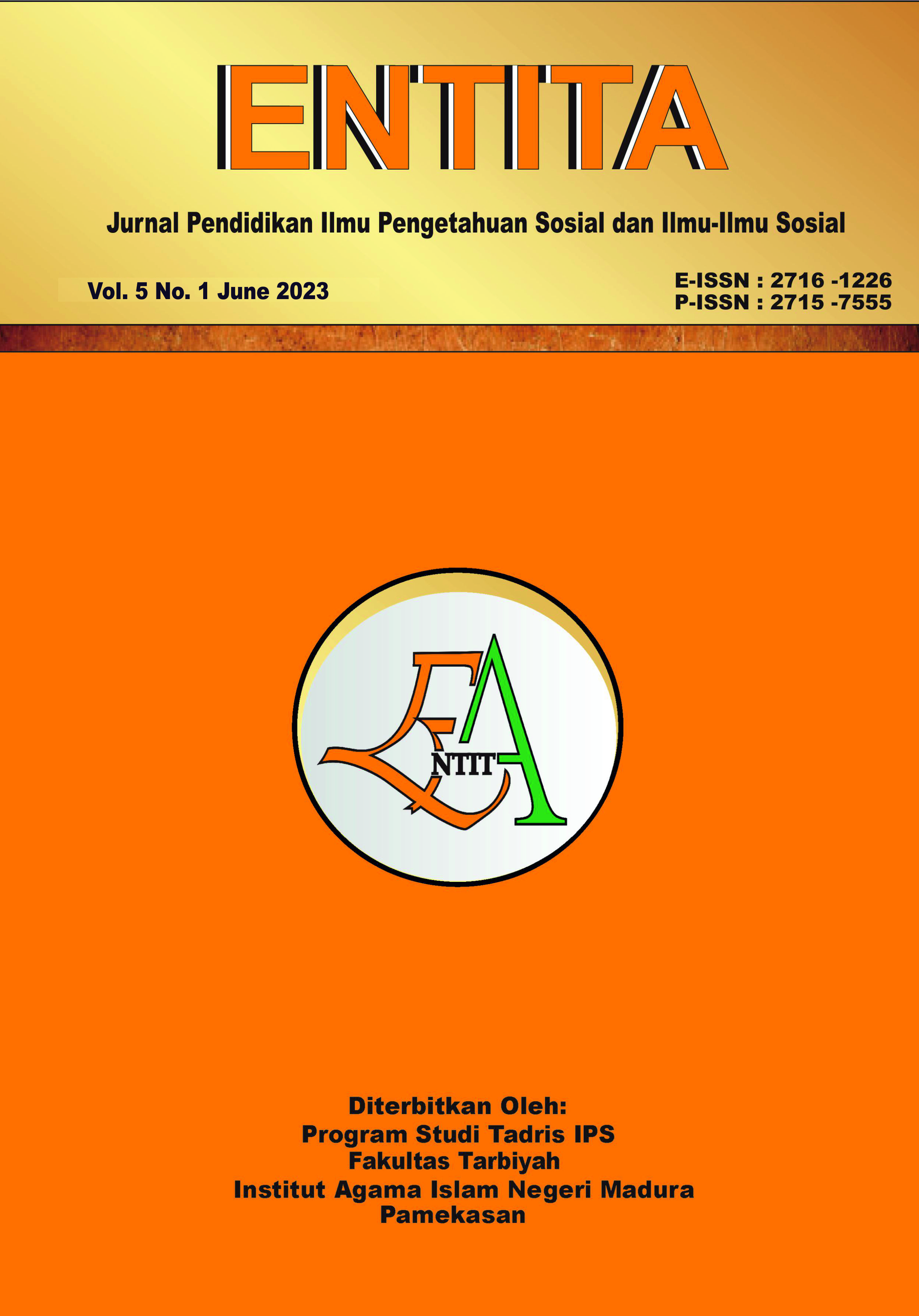Social Harmonization Values and Local Wisdom in the Cathering Culture of Wedding Ceremonies in Madura
 Abstract views: 326
,
Abstract views: 326
,
 PDF downloads: 286
PDF downloads: 286
Abstract
The sense of tolerance and community is highly upheld to create social harmony. However, as time went on, the community values were increasingly eroded due to the entry of a new culture, namely the catering culture which slowly shifted local traditions in the ceremonial marriage of the Madurese community, especially in kitchen matters which were originally cohesiveness, togetherness, intimacy, harmony, and high friendship become an individualist, hedonist society who prefers something instant and easy to put aside the values of harmonization among others. So, this study is intended to study further and more deeply about the values of social harmonization and local wisdom in the culture of catering wedding ceremonies in Madura. This research is qualitative approach with a descriptive study. The object of this research was Soloh Dajah Hamlet, Murtajih Village, Pademawu District, Pamekasan Regency. The results of the study state that: First, there are several values of the wedding ceremony as a locus of a social harmonization and local wisdom, namely: Religious values, kinship values, cohesiveness and cooperation values, and tolerance and solidarity values. Second, at Madurese wedding ceremonies, people tend to use catering services to make it easy. Third, the inequality that occurs in the values of social harmonization and local wisdom in the catering culture of Madurese wedding ceremonies, namely: The formation of apathy and bad views of society.
Downloads
References
Atabik Ahmad. (2016). Percampuran Budaya Jawa dan Cina: Harmoni dan Toleransi Beragama Masyarakat Lasem. Sabda. Volume 11.
Gayatri Dyah Suprobowati. (2021). DCF (Dieng Culture Festifal), Wujud Harmonisasi Antara Kearifan Lokal, Agama, dan Sosial ekonomi di Masyarakat Dataran Tinggi Dieng. Jolsic. Volume 9 Number 1 – April.
Hasani Utsman. (2020). Tengka, Etika Sosial Dalam Masyarakat Tradisional Madura. Yogyakarta: Sulur Pustaka.
Julianti Agung Wati, Nurul Veronika Saputri, Sarni Manurung, Benniqno Chrishagel, Sakman, Dan Dotrimensi, (2021). Sistem Tradisi Perkawinan Adat Dayak Ngaju Di Desa Pamarunan Kecamatan Kahayan Tengah. Jurnal Kewarganegaraan. Vol.5 No.2 Desember 2021.
Lukman Al Khafidz, (2019). Tradisi Pergeseran Manganan Perahu, Al-Mada; Jurnal Agama, Sosial dan Budaya, Vol 2, No.2.pp 76-91.
Moleong. J. Lexy. (2016). Metodologi Penelitian Kualitatif. Bandung: Remaja Rosdakarya. Cet 36.
Nasir. Moh. (2013) Metode Penelitian. Bogor: Graha Indonesia.
Nur Dwiana Sari Saudi. Rezki Arianty Akob, Abdul Rahman laba, Muhammad Sobarsyah, “Inovasi Produk Dan Keunggulan Kompetitif: Studi Pada Usaha Katering Di Kota Makasar,” Jurnal Ilmiah MEA (Manajemen, Ekonomi, dan akuntansi), vol.6, no. 3 (2022):
Nurgiansyah, T.H. (2021b). Pendidikan Pancasila Sebagai Upaya Membentuk Karakter Jujur, Jurnal Pendidikan Kewarganegaraan Undiksha, 9(1).
Pramudita Ananta Prabowo, (2013). Analisis Perilaku Konsumen Jasa Katering Untuk Keperluan Pesta Di Surabaya, Calyptra: Jurnal Ilmiah Mahasiswa Universitas Surabaya, Vol.2 No.1.
Rasji, R.Rahaditya, and Agung Valerama (2022), Membangun Kesadaran Hukum Masyarakat Desa Untuk Membangun Keluarga Yang Bahagia, Jurnal Bakti Masyarakat Indonesia, Vol.5, No. 2, Agustus 2022, hal 470-476.
Rezki Arianty Akob, Abdul Rahman Laba, Muhammad Sobarsyah, Nur Dwiana Sari Saudi, (2022). Inovasi Produk Dan Keunggulan kompetitif: studi Pada Usaha Katering di Kota Makasar, Jurnal Ilmiah MEA (Manajemen, Ekonomi, dan akuntansi), Vol 6 No.3, P-ISSN; 2541-5255 E-ISSN: 2621-5306, 653
Rifki Rosyad (dkk). (2021). Toleransi Beragama dan Harmonisasi Sosial. Bandung: Lekkas.
Rinitami Njatrijani, (2018). Kearifan Lokal Dalam Perspektif Budaya Kota Semarang, Gema Keadilah; Edisi Jurnal, Volume 5, Edisi 1, September 2018.
Try Agung Handayani Putra, (2017), Kearifan Lokal Upacara larungan Telaga Ngebel dalam Membangun Harmonisasi Sosial, Jurnal Civic Hukum, Volume 2, Nomor 2, November 2017
ENTITA: Jurnal Pendidikan Ilmu Pengetahuan Sosial dan Ilmu-Ilmu Sosial operates an Open Access policy under a Creative Commons Non-Commercial 4.0 International license. Authors who publish with this journal agree to the following terms:
- The copyright of the received article once accepted for publication shall be assigned to the journal as the publisher with licensed under a

- Journal is able to enter into separate, additional contractual arrangements for the non-exclusive distribution of the journal's published version of the work (e.g., post it to an institutional repository or publish it in a book), with an acknowledgement of its initial publication in this journal.
- Journal is permitted and encouraged to post their work online (e.g., in institutional repositories or on their website) prior to and during the submission process, as it can lead to productive exchanges, as well as earlier and greater citation of published work (see The Effect of Open Access).
- Here is Copyright Transfer Form that author can download and send to OJS during submission.

















